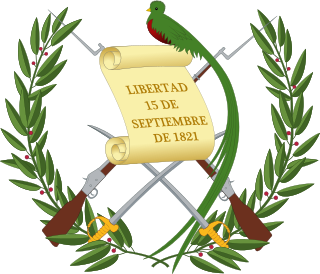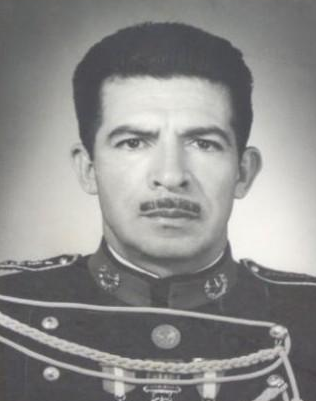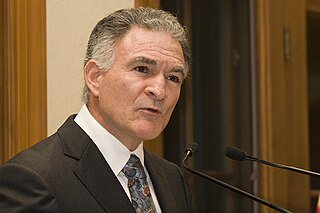Related Research Articles

Politics of Guatemala takes place in a framework of a presidential representative democratic republic, where by the President of Guatemala is both head of state, head of government, and of a multi-party system. Executive power is exercised by the government. Legislative power is vested in both the government and the Congress of the Republic. The judiciary is independent of the executive and the legislature. Guatemala is a Constitutional Republic.

José Efraín Ríos Montt was a Guatemalan military officer and politician who served as de facto President of Guatemala in 1982–83. His brief tenure as chief executive was one of the bloodiest periods in the long-running Guatemalan Civil War. Ríos Montt's counter-insurgency strategies significantly weakened the Marxist guerrillas organized under the umbrella of the Guatemalan National Revolutionary Unity (URNG), while also leading to accusations of war crimes and genocide perpetrated by the Guatemalan Army under his leadership.

Álvaro Enrique Arzú Irigoyen was a Guatemalan politician and businessman who served as the 32nd President of Guatemala from 14 January 1996 until 14 January 2000. He was elected Mayor of Guatemala City on six occasions: in 1982, when he declined taking office because of a coup d'état; in 1986; in 2003, after serving as president; in 2007; in 2011, and in 2015, for a term that would see him die in office.

The Guatemalan National Revolutionary Unity is a Guatemalan political party that started as a guerrilla movement but laid down its arms in 1996 and became a legal political party in 1998 after the peace process which ended the Guatemalan Civil War.

General elections were held in Guatemala on 9 November 2003, with a second round of the presidential election held on 28 December. Óscar Berger won the presidential election, representing the Grand National Alliance, a coalition of alliance of the Patriotic Party, the Reform Movement and the National Solidarity Party. The Alliance were also victorious in the Congressional elections, winning 47 of the 158 seats. Voter turnout was 57.9% in the Congressional elections, 58.9% in the first round of the presidential elections and 46.8% in the second.

Alfonso Antonio Portillo Cabrera is a Guatemalan politician who served as President of Guatemala from 2000 to 2004.

The Institutional Republican Party, until 2013 known as the Guatemalan Republican Front, was a right-wing to far-right political party in Guatemala.

Zury Mayté Ríos Sosa is a Guatemalan politician. She is the daughter of the late general, and President of Guatemala Efraín Ríos Montt.

The Plan de Sánchez massacre took place in the Guatemalan village of Plan de Sánchez, Baja Verapaz department, on 18 July 1982. Over 250 people were abused and murdered by members of the armed forces and their paramilitary allies.
Héctor Fernando Ramírez, better known as Reportero X died on July 24, 2003 of a heart attack in Guatemala City while being chased by a mob in what is referred to as jueves negro. He was 61 years old. He had started his career as a radio news reporter. When he died he was a reporter for the TV channel Noti-7, though he was also working for Radio Sonora.

Dionisio Gutiérrez Mayorga is a Guatemalan businessman and media personality. He is currently the President of Fundación Libertad y Desarrollo.
The 1993 Guatemala constitutional crisis took place in 1993 when then President Jorge Serrano Elías attempted a self-coup or autogolpe. On Tuesday May 25, 1993, Serrano illegally suspended the constitution, dissolved Congress and the Supreme Court, imposed censorship, and tried to restrict civil freedom.

Vision with Values is a political party in Guatemala.

General elections were held in Guatemala on 16 June 2019, to elect the President, Congress and local councils. A second round of the presidential elections was held on 11 August 2019, since no candidate won a majority in the first round. Alejandro Giammattei won the election in the second round of voting.
María Teresa Sosa Ávila was a Guatemalan politician. She was the widow of President of Guatemala Efraín Ríos Montt and mother of Zury Ríos. She was a candidate for the Presidency for the Guatemalan Republican Front in the elections of 1995. Her candidacy was annulled by the Citizen Registry, because she could not be elected to the position under the express prohibition contained in article 186, subsection c) of the Constitution of Guatemala. She was succeeded as her party's candidate by Alfonso Portillo, who subsequently won the 1999 elections.

Valor is a conservative and right-wing populist political party in Guatemala.

Roberto Molina Barreto is a Guatemalan lawyer and politician, who served as Attorney General of the Nation from 2005 to 2006, magistrate of the Constitutional Court from 2006 to 2016 and from 2020 and President of the Constitutional Court on three occasions.

General elections will be held in Guatemala on 25 June 2023 to elect the president and vice president, all 160 seats of the Congress, all 20 members of the Central American Parliament, and mayors and councils for all 340 municipalities in the country. Incumbent president Alejandro Giammattei is constitutionally prohibited from running for a second four-year term.

Héctor Adolfo Cifuentes Mendoza is a Guatemalan lawyer and politician who served as Minister of Labor and Social Welfare from 1997 to 1998. He is the vice presidential nominee in the 2023 election running alongside Zury Ríos.
Carlos René Pineda Sosa is a Guatemalan politician and businessman running in the 2023 Guatemalan general election. He is seen as a political dark horse, and is making his first run for the presidency under Citizen Prosperity where polls as of mid-April 2023 placed him as a frontrunner.
References
- ↑ "Arraigan a RÃos Montt y seis más". Prensa Libre. 6 March 2004. Archived from the original on 10 July 2007. Retrieved 30 July 2022.
{{cite news}}: CS1 maint: bot: original URL status unknown (link) - ↑ "Guatemala politicians were racist". BBC News. 5 April 2005. Retrieved 30 July 2022.